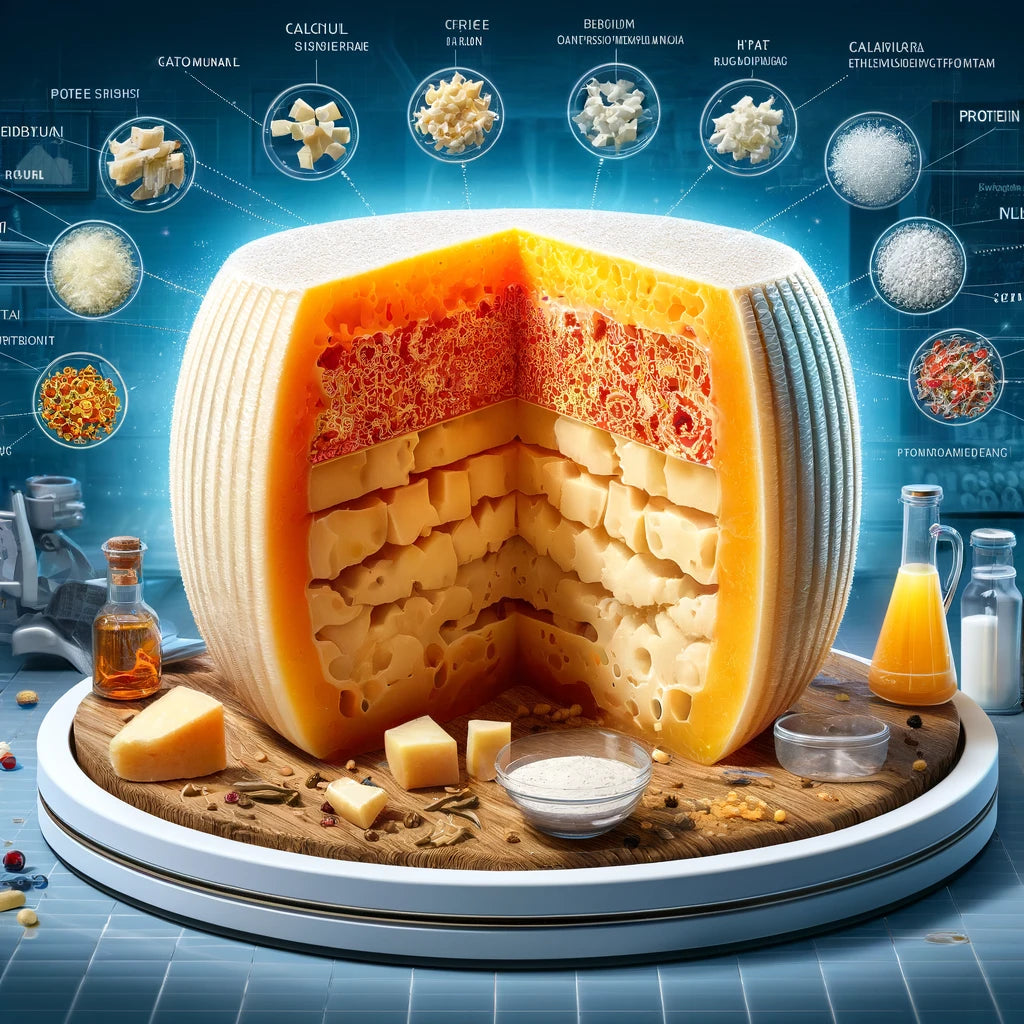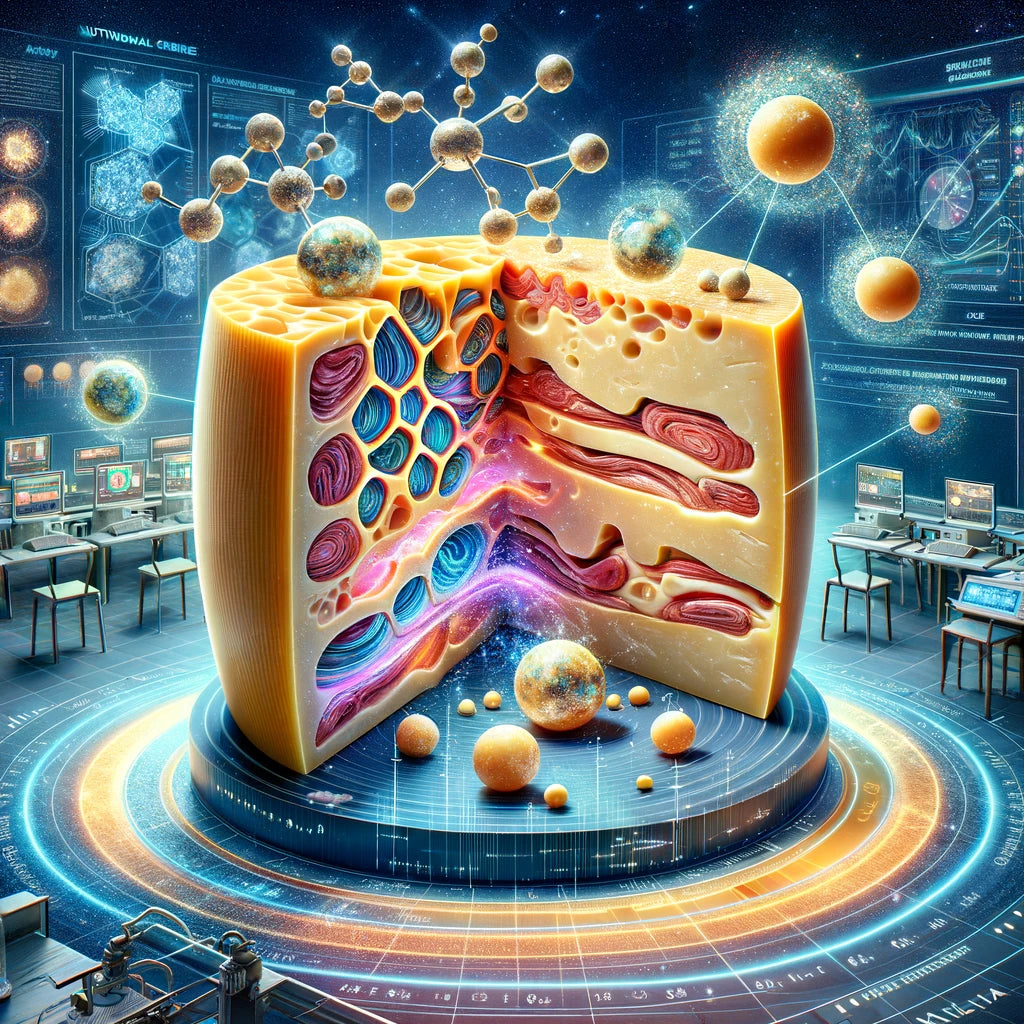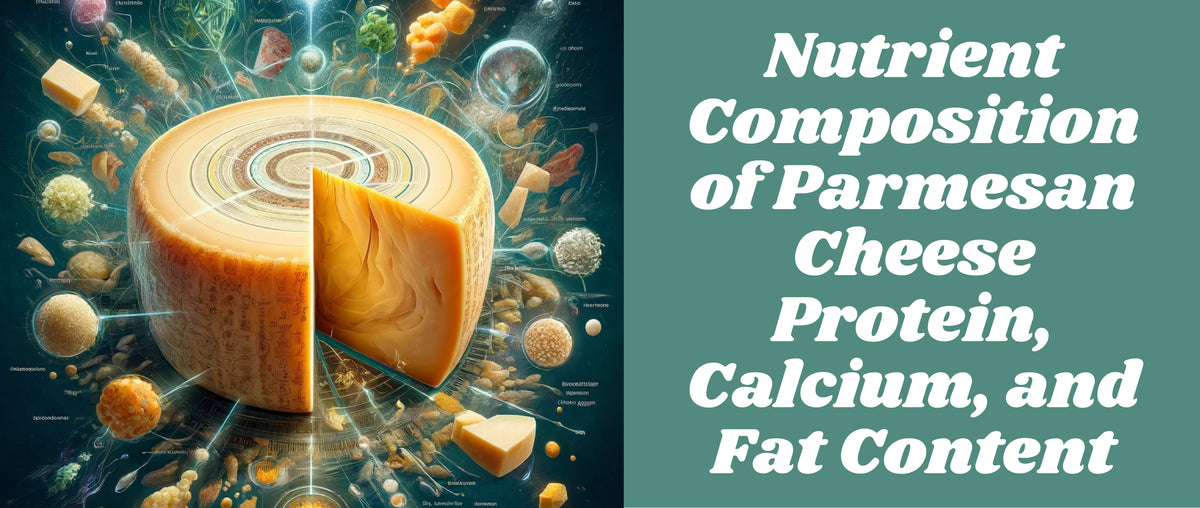Nutrient Composition of Parmesan Cheese: Protein, Calcium, and Fat Content
Parmesan cheese, a cornerstone of culinary tradition, stands out not just for its bold flavor but also for its remarkable nutritional profile. Often referred to by its Italian name, Parmigiano Reggiano, this cheese has transcended its geographical origins to become a global staple in kitchens and restaurants alike. Its rich history, coupled with a meticulous production process, yields a cheese that is as nutritious as it is delicious. This guide aims to explore the nutritional essence of parmesan cheese, focusing on its protein, calcium, and fat content, while also shedding light on its broader health benefits.
The Nutritional Essence of Parmesan Cheese
Protein Content
Parmesan cheese is a rich source of protein, making it an excellent addition to any diet. A single ounce of Parmesan typically contains around 10 grams of protein, providing a substantial boost to your daily protein intake.
Calcium Content
Calcium is essential for bone health, and Parmesan cheese is loaded with it. Just one ounce of Parmesan can provide up to 30% of your recommended daily calcium intake, making it an excellent choice for maintaining strong and healthy bones.
Fat Content
While Parmesan cheese is known for its rich flavor, it is relatively low in fat compared to other cheeses. One ounce of Parmesan typically contains around 7 grams of fat, with most of it being saturated fat. However, the small serving size means that it can be enjoyed as part of a balanced diet without overdoing it on fat intake.
Health Benefits
In addition to its protein, calcium, and fat content, Parmesan cheese offers a range of health benefits. It is a good source of vitamins and minerals, including vitamin A, vitamin B12, and zinc. Parmesan cheese also contains probiotics, which are beneficial bacteria that support gut health.

What is Parmesan Cheese?
Parmesan cheese, a hard, granular cheese named after the areas of Parma, Reggio Emilia, Modena, and Bologna in Italy, is known for its intense flavor and versatile use in dishes. Unlike vegan cheese or plant-based cheese options, Parmesan is made from cow's milk, emphasizing the rich dairy heritage that defines its profile. Its unique texture and taste make it an irreplaceable ingredient in many recipes, offering a depth of flavor that enhances the overall culinary experience.
How Is Parmesan Cheese Made?
The making of Parmesan cheese is an art that has been refined over centuries. Starting with high-quality cow's milk, the process involves natural fermentation, followed by a lengthy aging period that can last several years. This aging process is crucial, as it intensifies the cheese's flavor while allowing it to develop its distinctive granular texture. The result is a Parmesan cheese block that is rich in nutrients and bursting with flavor.
Nutrient Composition of Parmesan Cheese
Protein Content
Parmesan cheese is a powerhouse of high-quality protein, essential for muscle repair and growth. It provides all the essential amino acids required by the body, making it an excellent source of nutrition for vegetarians and those looking to add more protein to their diets. Unlike some vegan items or low fat cheese options, Parmesan offers a robust profile of both flavor and nutritional benefits.
- Protein in Parmesan: A single ounce of Parmesan cheese can contain as much as 10 grams of protein, contributing significantly to daily protein requirements.
Calcium Content
Calcium is another critical nutrient found abundantly in Parmesan cheese. Known for its vital role in bone health, calcium also supports the functioning of the heart, muscles, and nerves.
- Calcium Levels in Parmesan: Parmesan cheese provides one of the highest calcium contents among cheeses, making it a beneficial addition to the diet for bone strength and density.
Fat Content
While Parmesan cheese does contain fat, it's important to distinguish between the types of fats present. Parmesan has a balance of saturated and unsaturated fats, with research suggesting that cheese fat may not have as detrimental an impact on heart health as previously thought. In fact, the fat in Parmesan cheese can contribute to the sensation of fullness and satisfaction after a meal, potentially aiding in weight management efforts.
- Types of Fats in Parmesan: The fat composition in Parmesan cheese includes both saturated and unsaturated fats, providing energy and aiding in the absorption of fat-soluble vitamins.
Incorporating Parmesan Cheese into Your Diet
Parmesan cheese's versatility makes it an excellent addition to a variety of dishes, from classic Italian pastas and risottos to salads and soups. Here are some tips for including Parmesan in your meals:
- Sprinkle over dishes: A light sprinkle of grated Parmesan can add a flavor boost to almost any dish.
- Use in cooking: Incorporate Parmesan into your cooking for a deeper flavor profile in sauces and baked dishes.
- Healthy recipes: Experiment with Parmesan in healthy recipes, balancing its rich flavor with plenty of vegetables and whole grains.
Health Benefits of Parmesan Cheese
Parmesan cheese is not only a delight for the taste buds but also a powerhouse of nutrition, offering several health benefits:
- Bone Health: The high calcium content in Parmesan cheese is crucial for maintaining strong bones and teeth, reducing the risk of osteoporosis. This is particularly important for individuals who may not consume enough calcium through other dietary sources.
- Muscle Function: Parmesan cheese's protein contributes significantly to muscle repair and growth. It's especially beneficial for athletes or anyone engaged in regular physical activity.
- Metabolic Health: Despite its fat content, Parmesan cheese can play a role in a healthy diet when consumed in moderation. The fats in Parmesan may help promote satiety, reducing overall calorie intake.
Incorporating unprocessed cheese like Parmesan into your diet can provide these benefits while adding depth and flavor to your meals.
Nutritional Characteristics of Parmigiano Reggiano: A Functional Food for Bone Health?
Parmigiano Reggiano, the king of Parmesan, stands out not just for its taste but also for its functional properties:
- Rich in Bioavailable Nutrients: Beyond calcium and protein, Parmigiano Reggiano is packed with bioavailable nutrients, meaning they are readily absorbed and utilized by the body. This makes Parmesan an excellent choice for supporting overall health and well-being.
- Lactose-Free: The long aging process naturally removes lactose, making Parmesan a suitable option for those with lactose intolerance.
- Contains Beneficial Bacteria: The fermentation process introduces probiotics, beneficial bacteria that support gut health and may enhance immune function.
Incorporating Parmesan Cheese into Your Diet
Here are some creative and healthful ways to enjoy Parmesan:
- As a Topping: Grate it over salads, soups, and pastas for an instant flavor upgrade.
- In Cooking: Use it in pesto, or as a crust for baked chicken for a protein-packed meal.
- Snacking: Enjoy small portions of Parmesan as a satisfying snack, paired with fruits or nuts.
Balancing Your Diet with Parmesan Cheese
While Parmesan cheese offers numerous health benefits, it's important to consume it as part of a balanced diet:
- Portion Control: Due to its rich flavor, a little goes a long way in terms of both taste and nutrition.
- Pair Wisely: Combine Parmesan with vegetables and whole grains to balance out its rich taste and density with lighter, fiber-rich foods.

Comparative Analysis with Other Cheeses
When comparing Parmesan cheese to other varieties, such as Mozzarella Cheese or vegan cheese options, it's essential to consider not only the taste and culinary uses but also the nutritional aspects:
- Mozzarella vs. Parmesan: Mozzarella, especially when in a mozzarella cheese block, is known for its high moisture content and lower salt level. It's rich in protein but generally has a lower calcium content than Parmesan. Mozzarella is preferred for its melting qualities, making it ideal for pizzas and casseroles.
- Vegan Cheese Alternatives: Vegan Cheese and plant based cheese options are often made from nuts, soy, or root vegetable starches. While they can mimic the texture and flavor of cheese to a certain extent, they typically do not offer the same nutrient density, especially in terms of protein and calcium, as dairy-based cheeses like Parmesan.
- Low Fat and Unprocessed Cheese: low fat cheese options are available for those monitoring their fat intake. However, these cheeses may lack the full flavor profile of traditional cheeses. Unprocessed Cheese, like Parmesan, retains its natural nutrients and enzymes, offering more health benefits than processed versions.
Conclusion: Embracing Parmesan Cheese
Parmesan cheese, with its rich flavor and dense nutritional profile, offers more than just a culinary delight. Its high protein, calcium, and beneficial fat content make it a valuable addition to a balanced diet. Compared to other cheeses and vegan cheese alternatives, Parmesan stands out for its unique health benefits, particularly in supporting bone health and aiding in weight management. By incorporating Parmesan into your diet wisely, you can enjoy its exquisite taste while taking advantage of its nutritional benefits.
In embracing Parmesan, you're not just choosing a cheese; you're choosing a tradition of excellence, a boon to your health, and a journey into the depths of culinary artistry. As we conclude this guide, remember that Parmesan cheese is more than just an ingredient; it's a testament to the beauty of well-crafted food and the health benefits that come with mindful eating.








